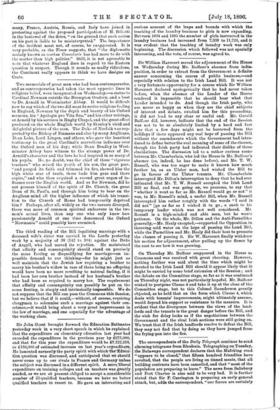The third reading of the Bill legalising marriage with a
deceased wife's sister was carried in the Lords yesterday week by a majority of 38 (142 to 101) against the Duke of Argyll, who had moved its rejection. He maintained that affinity and consanguinity should stand on precisely the same footing as disqualifying for marriage—an im- possible demand to our thinking—for he might just as well maintain that the Jewish law requiring a brother to marry his brother's widow in case of there being no offspring would have been no more revolting to natural feeling, if it had been her own brother instead of her husband's brother who had been so required to marry her. The requirement that affinity and consanguinity can possibly be put on the same footing, is simply and intrinsically impossible. We do not suppose that the Bill can pass the Commons this Session, but we believe that if it could,—without, of °purse, requiring clergymen to solemnise such a marriage against their con- science,—it would bring about a very great improvement in the law of marriage, and one especially for the advantage of the working class.


































 Previous page
Previous page